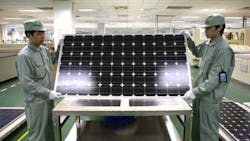US Commerce Department Confirms Hefty Duties on Chinese Solar Cells
The United States confirmed Wednesday hefty anti-dumping and anti-subsidy duties on Chinese solar cell makers that have added to trade tensions between the two economic powers.
In response, China's Commerce Ministry expressed "strong dissatisfaction" with the U.S. decision and said it hoped Washington would "amend its mistaken ways" and terminate the duties "as soon as possible."
The Commerce Department issued a final confirmation of its May finding that Chinese producers and exporters had been selling solar cells into the United States at artificially low prices, and put the anti-dumping duties at between 18% and 250%.
It meanwhile put countervailing duty levels, originally set in March to offset China's subsidies, at 15% to 16%, mainly to counter an "export buyer's credit" from the Chinese government.
Suntech Power, Trina Solar Named as Key Offenders
It named Suntech Power (IW 1000/986), the world's largest maker of solar cells, and another large producer, Trina Solar, as key offenders, but said at least 60 other Chinese companies would also be hit with anti-dumping charges.
Both moves take aim at a huge market that Chinese exporters have come to dominate with the help of vast state subsidies, their U.S. rivals say.
The Commerce Department ordered the collection of cash deposits on imported solar equipment from the Chinese companies, crucially dating back to 90 days before the preliminary anti-dumping duty ruling in May.
Wuxi Suntech, though, was exempted from the 90-day retroactive collection; duties on its products will date to the May decision.
The duty decisions still must be confirmed by the U.S. International Trade Commission, which is expected to rule by Nov. 23.
Angered China is Pursuing Solar Industry Probe
Angered by the U.S. action on its solar industry, on July 20 Beijing launched its own probe into alleged U.S. subsidies for and dumping of a kind of polysilicon used to produce solar batteries.
"The Ministry of Commerce will investigate the dumping and subsidy situations... and the harms they caused to the industry in China and come to a ruling according to the law," it said.
Copyright Agence France-Presse, 2012
About the Author
Agence France-Presse
Copyright Agence France-Presse, 2002-2025. AFP text, photos, graphics and logos shall not be reproduced, published, broadcast, rewritten for broadcast or publication or redistributed directly or indirectly in any medium. AFP shall not be held liable for any delays, inaccuracies, errors or omissions in any AFP content, or for any actions taken in consequence.
